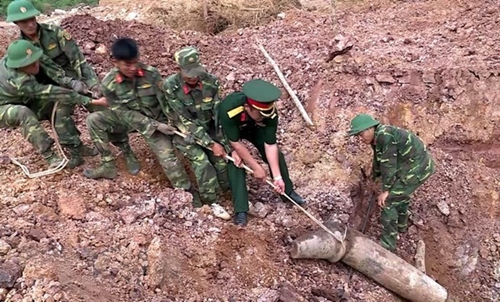The two countries are celebrating 25 years of diplomatic ties on July 12 this year and 2020 also marks the 25th anniversary of PeaceTrees Vietnam, the first US non-governmental organisation (NGO) licenced to operate in UXO search and clearance in Vietnam.
    |
 |
|
Military engineers move an unexploded bomb in Quang Tri province. |
Members of its mobile UXO clearance team in Quang Tri’s mountainous Dakrong district have increased from 36 in 2003 to 106 at present, including some of the local Pa Ko and Van Kieu ethnic minorities.
PeaceTrees Vietnam is ramping up efforts to complete clearance next year in areas of Dakrong blighted by cluster bombs.
Across Quang Tri, PeaceTrees Vietnam has combed more than 480ha of land and disposed of over 112,000 UXO items.
It has also carried out community activities such as providing healthcare and clean water for local people, presenting over 2,000 scholarships to students suffering from UXO accidents, and planting tens of thousands of trees in areas already cleared of UXO, which will help with environmental restoration and people’s livelihoods.
Meanwhile, RENEW, a cooperative programme between Quang Tri and foreign NGOs, and Norwegian People’s Aid (NPA) have implemented the RENEW-NPA project in the province since 2001. Sponsored by the US Department of State and the UK Department for International Development, the project aims to restore the environment and address the consequences of war, especially UXOs.
In mid-June, RENEW-NPA deployed to the area near the beach of Thai Lai hamlet in Vinh Thai commune, Vinh Linh district, which is heavily contaminated by UXOs, especially cluster bombs. The hamlet has recorded 15 UXO-related accidents since 1975, killing five and injuring 11.
RENEW-NPA said it has located and safely detonated 23 cluster bombs and hundreds of items of explosive materials in the area, noting that UXO clearance will provide a safe environment to more than 870 local residents and allow for farming activities.
After five years, in June, the project finished a non-technical survey in all areas it was permitted to access, equal to 76 percent of all hamlets and villages in Quang Tri. It interviewed more than 51,000 people to collect information relating to cluster bombs and other types of explosives.
RENEW-NPA said the non-technical survey is one of the most important steps in creating an overall map of areas polluted by cluster bombs in Quang Tri, thereby helping local authorities and relevant parties build effective UXO search and clearance plans.
Golden West Humanitarian Foundation, another NGO from the US, has also funded Quang Tri with nearly 95,000 USD to carry out a project providing technical advice, training, and capacity building cooperation in post-war explosives detection and clearance.
The project is to improve knowledge about explosives handling for two UXO detection teams at the Quang Tri Military Command, help upgrade necessary equipment for their training and task performance, and set up rotational teams.
Up to 82 percent of Quang Tri’s total area is contaminated with UXOs, which have killed more than 3,430 people and injured 5,100.
Over the last 25 years, programmes and projects have assisted Quang Tri with about 80 million USD to detect and clear UXOs, including nearly 40 million USD from the US Government via NGOs.
The province used to report about 70 UXO accidents each year, but the number has fallen sharply since it began cooperating with foreign organisations to carry out UXO detection and clearance in 1995. Notably, 2018 was the first year without UXO accidents in Quang Tri.
The province aims to become the first Vietnamese locality to be free of UXO incidents by 2025, and it will need about 10-12 million USD each year to that end.
US Ambassador to Vietnam Daniel Kritenbrink said the two countries’ cooperation in UXO clearance has proven successful, saving a large number of lives and millions of square metres of land for economic development, and his country pledges to continue settling the consequences of war.
Source: VNA